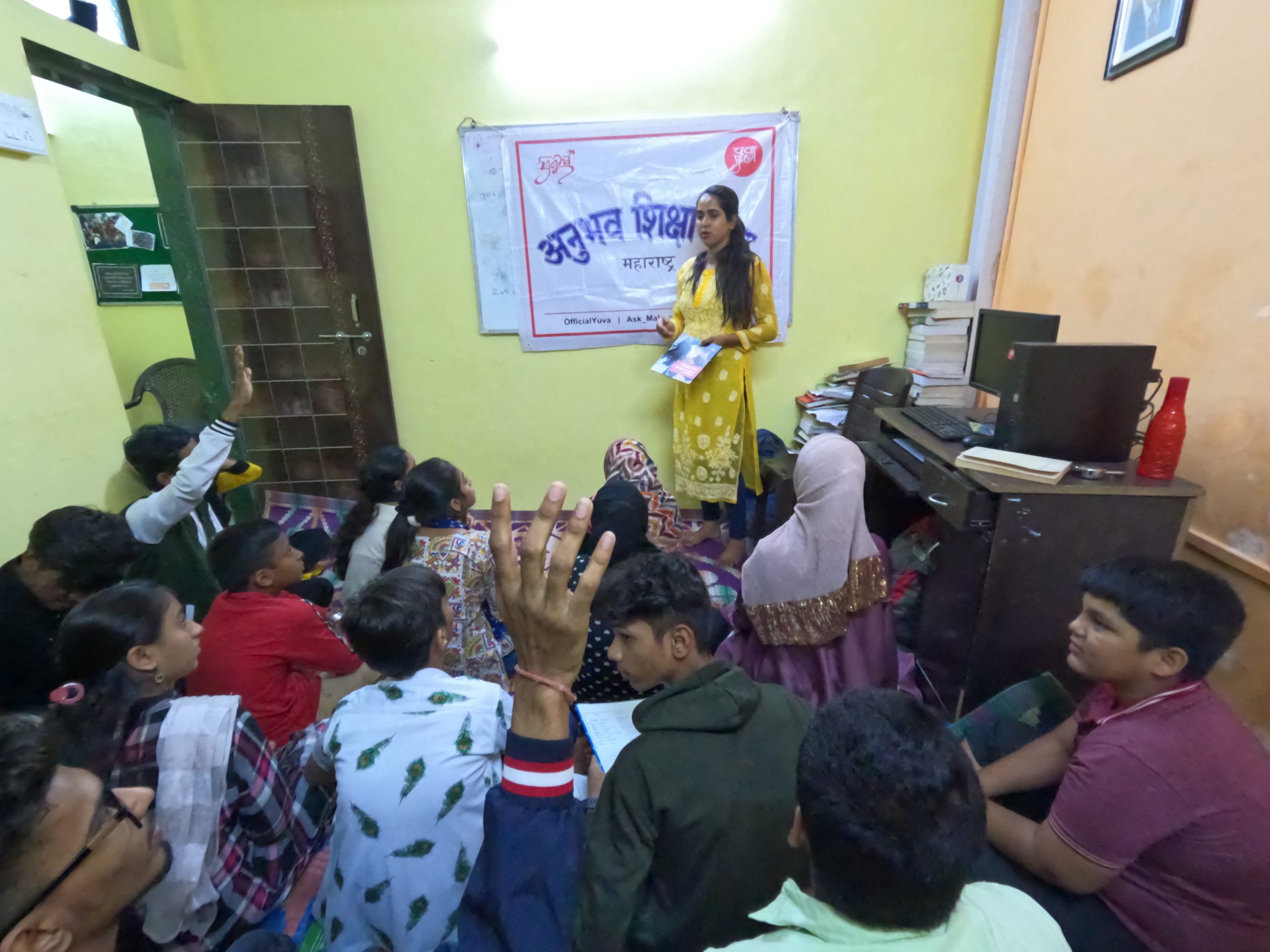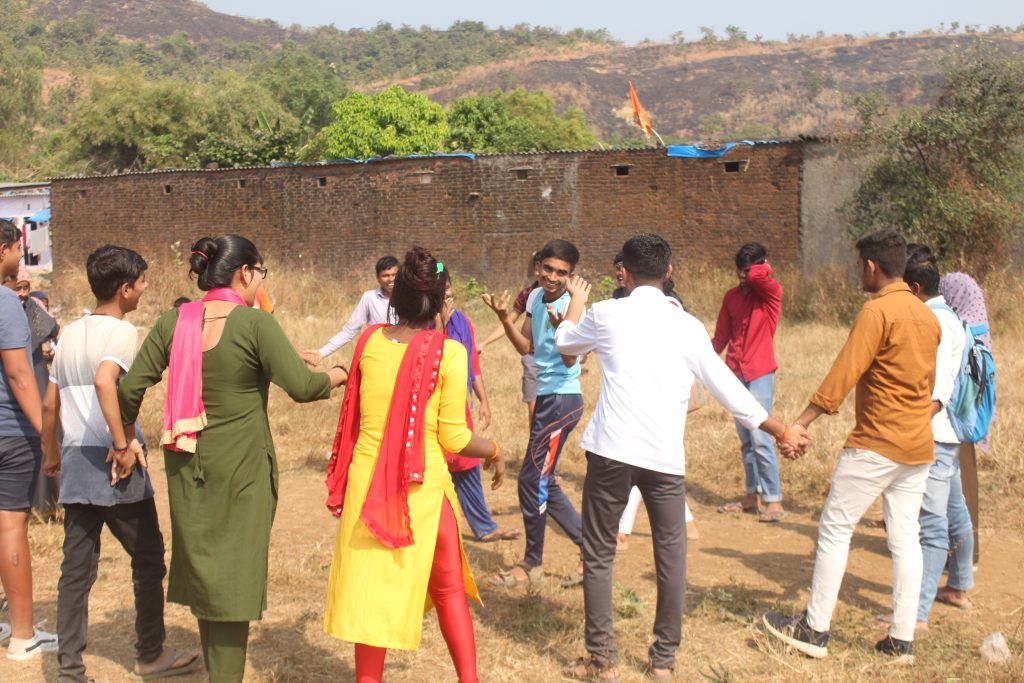This is the first of a two-part blog that introduces the Anubhav Shiksha Kendra (ASK) of YUVA which has been engaging with the youth in Maharashtra for the last 3-decades. The second part can be read here.
A Youth Collective for Change
Youth (loosely defined as people between the ages of 15 and 29) are one of the most important, energetic, and dynamic segments of a country’s demography, of which India has the world’s largest, at approximately 30% of the country’s total population of 1.2 billion. Today’s young people are tomorrow’s innovators, creators, builders, and leaders, provided there is sufficient investment in young people’s education and health, protection of their democratic rights, and assistance to allow them to fulfil their aspirations. India’s youth has tremendous potential to induce positive social transformation across Indian society.
This is the context out of which emerged the Anubhav Shiksha Kendra (ASK) programme of Youth for Unity and Voluntary Action (YUVA). In 1993, YUVA initiated ASK programme as an experiential learning programme for youth with the aim of building safe spaces for the youth to grow, build their skills, confidence and personality; to shape and enhance their worldview by inducing a sense of curiosity and awareness about their social and political environment; and to facilitate their engagement in the positive transformation of their communities. Over the last 30 years, the ASK programme has expanded to 28 districts in Maharashtra and Madhya Pradesh. The programme has united young people from diverse social backgrounds, including across rural and urban settings, class, caste, gender, and religion to build a more inclusive and equitable future.

I. An Experiential Learning Programme
The thematic focus of this programme revolves around the three pillars of livelihood, governance, and gender. Since livelihood is often the first and foremost priority in the lives of young people, this aspect of the programme transcends the restricted development of job-specific talents and instead supports an all-encompassing approach to economic resilience, empowering and inviting them to investigate new, alternative sustainable livelihoods. The development of youth leadership and voices at the local level in both urban and rural communities deepens their involvement in governance, which contributes to a rise in public pressure for equity-focused initiatives and policies; therefore, the second facet of the programme is directed towards governance. Finally, the emphasis on gender aims to broaden the understanding of feminism as an ideology of equality, challenge the gender stereotypes imposed by society and develop respect for diverse identities. Additionally, participants of the programme are encouraged to discuss, debate, and deliberate on issues and affairs surrounding the core values of ASK which are social justice, gender justice, ecological justice, secularism and democracy, dignity of labour and honesty and integrity. These discussions help the youth engage in analytical thinking by critiquing widely accepted and established forms of knowledge and evidence, while simultaneously engaging in participatory knowledge creation processes and co-creating inclusive social spaces.
Due to its unique programme design, ASK has grown exponentially. Between 2017–2020, over 1,47,000 youth (across genders) engaged in the programme, and 27,500+ youth actively engaged as ASK members across 28 districts in Maharashtra and Madhya Pradesh, both in rural and urban environments.
II. Design of Anubhav Shiksha Kendra (ASK) Programme
In its design, ASK prioritises spaces for critical reflection and creative expression of young people. The programme’s value framework of equality, justice, and fraternity forms the bedrock of interactive sessions and initiatives. Trainers collaborate with participating youth to co-create journeys of empowerment and leadership for change. Communication with youth happens in diverse ways. Some of the key communication mediums are as follows:
1. Onground, via anubhav kattas, and bolta kattas.
Anubhav kattas are the primary interaction forums conducted weekly for young people and are led by youth leaders at the community level. Anubhav kattas build grassroots outreach, and offer spaces for youth to freely engage with one another, build local networks and capacities for change. Currently, there are 103 anubhav kattas, reaching out to 2,500 youth. Each anubhav katta (youth club) has a leader, who has to undergo the Youth Leadership Building Course (YLBC), where they are taught about governance and how they engage with governance-related processes. Bolta kattas are organised monthly as open discussion forums among youth at the taluka level. Youth steer these discussions, often focusing on current issues. It’s open format provides a safe space for youth to engage and learn from each other.

2. Travel, via chalta kattas, exposure visits, and exchange programmes
Chalta kattas (walks and treks) offer youth the opportunity to learn via recreational activities. These enable learning from diverse environments through exposure to new sites. Organised at the district level, chalta kattas help youth to learn about social issues creatively, interactively, and intuitively. Exposure visits are organised frequently to help youth engage with activists, civil society leaders, government officials and other stakeholders, in order to better understand society, social movements, civil society processes, government systems, and more. Perspectives are built through experiential learning. Youth exchange programmes are organised monthly, to help youth across districts visit other areas, learn from different contexts, and build their knowledge and perspective on issues.
3. Dedicated learning and interaction spaces, such as community centres and libraries
Discussions, activities, and workshops within community centres and in community spaces offer a nourishing space for youth to participate. Community libraries have proven generative spaces to spur critical thinking and expression among the youth. Book reading and discussion sessions hosted here have further broadened youth thinking and expression. Currently, fourteen community libraries are operational across Maharashtra and Madhya Pradesh, which are led by youths of the area. Their participation in these spaces builds their sense of ownership and responsibility towards their own learning and development and inspires more young people to join them.
III. Three-Tier Participation Structure
Under this programme, youth proceed through three levels of participation – Mitra (concerned friend), Sahayogi (change agent) and Sathi (leader). As a Mitra, the youth reflect upon their contexts and situations, and attend awareness and training programmes; as a Sahayogi, youth motivate others and play the role of change agents in their respective communities; Sathis organise programmes and initiatives independently as leaders. This participation structure is illustrated below.

This three-tier participation structure allows for the gradual introduction of youth to leadership and social transformation in a way that is community-centered and empowering. There is a natural progression from members’ position within the group which facilitates personal, character, and community growth as members learn new skills and increasingly engage with the issues that affect them. Reflecting on the programme design, ASK member, Shahenshah Ansari says, “The programme’s structure of sathi, mitra and sahayogi is quite unique I feel, helping youth better contribute and learn from their own journey and milestones.”
ASK operates across various levels within and spanning regions and localities. Youth who are members of anubhav kattas establish taluka committees through democratic processes. There are fifty-one such committees across Maharashtra state at present. Representatives from taluka committees converge upwards to form district committees, of which there are currently thirty-six. This structure finally converges to the state (prabhari) committee of ASK. Given its structured design, ASK ensures that the process can be taken forward sustainably by youth across levels of participation and leadership development. This structure is illustrated below.

A Self-Reliant Youth Movement
Anubhav Shiksha Kendra (ASK) is an exceptionally unique youth development and leadership programme. Every component of the programme is sustained, operated, and implemented by the young participants to build community networks and develop youth leadership, bringing about systemic change right from local to state levels. The programme is a self-reliant youth movement which facilitates young peoples’ right to participate in decision making capacities and in exercising choice in self-determining the course of their own lives.


